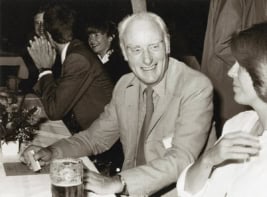
Jocelyn Bell Burnell has been awarded a Special Breakthrough Prize in Fundamental Physics for her work on pulsars and her “inspiring scientific leadership over the last five decades”. Bell Burnell says she will donate the $3m prize money from the Fundamental Physics Prize Foundation to create a new fund to support greater diversity for women and people from ethnic minorities. The money will be given to the Institute of Physics (IOP), which publishes Physics World, to support graduate students from under-represented groups.
Bell Burnell rose to fame while working at Cambridge University in 1967, when she identified a mysterious trace in data from a radio telescope she had built. It was a 0.5 cm-long signal that showed a series of regular peaks in luminosity. She concluded that the signal was neither a scintillating source, nor man-made interference but from a pulsar – a rotating neutron star that emits a regular ticking signal of radio waves. In February 1968, the Cambridge team, with her supervisor Antony Hewish as lead author, published a paper in Nature (217 709), announcing the “Observation of a rapidly pulsating radio source”.
Bell Burnell’s discovery of pulsars will always stand as one of the great surprises in the history of astronomy
Edward Witten
The discovery led to one of the first empirical confirmations of Einstein’s general theory of relativity. It also led to Hewish sharing the 1974 Nobel Prize for Physics with fellow astronomer Martin Ryle, though Bell Burnell was overlooked for the award.
“Bell Burnell’s discovery of pulsars will always stand as one of the great surprises in the history of astronomy,” says Edward Witten from the Institute for Advanced Study in Princeton who chairs the selection committee for the Breakthrough Prize. “Until that moment, no one had any real idea how neutron stars could be observed, if indeed they existed. Suddenly it turned out that nature has provided an incredibly precise way to observe these objects, something that has led to many later advances.”
Opening doors
Bell Burnell, a former president of the IOP, says the money will be used to create new graduate studentships for people from underrepresented groups in physics. “We at IOP are delighted to receive this donation from Jocelyn and are looking forward to working with her to develop a programme that opens doors to physics for people from every walk of life,” notes IOP president Julia Higgins.
The details of the fund are still being worked on with further information to be “provided in due course”. IOP chief operating officer Rachel Youngman adds that the donation “will enable us to connect with a greater range of under-represented groups and by doing so, enrich physics as a discipline with an increasingly diverse intake of students practising it”. ‘Look happy dear, you’ve just made a discovery’
This is the fourth Special Breakthrough Prize to be awarded, which are given “in recognition of an extraordinary scientific achievement”. Previous winners include Stephen Hawking, seven CERN researchers who were behind the discovery of the Higgs boson in July 2012, as well as the entire collaboration working on the Laser Interferometer Gravitational-Wave Observatory that announced the direct detection of gravitational waves in February 2016.
Bell Burnell will be given the award at a ceremony on 4 November 2018 in San Francisco where the laureates of the annual Breakthrough Prize in physics, the life sciences and mathematics will also be honoured.




